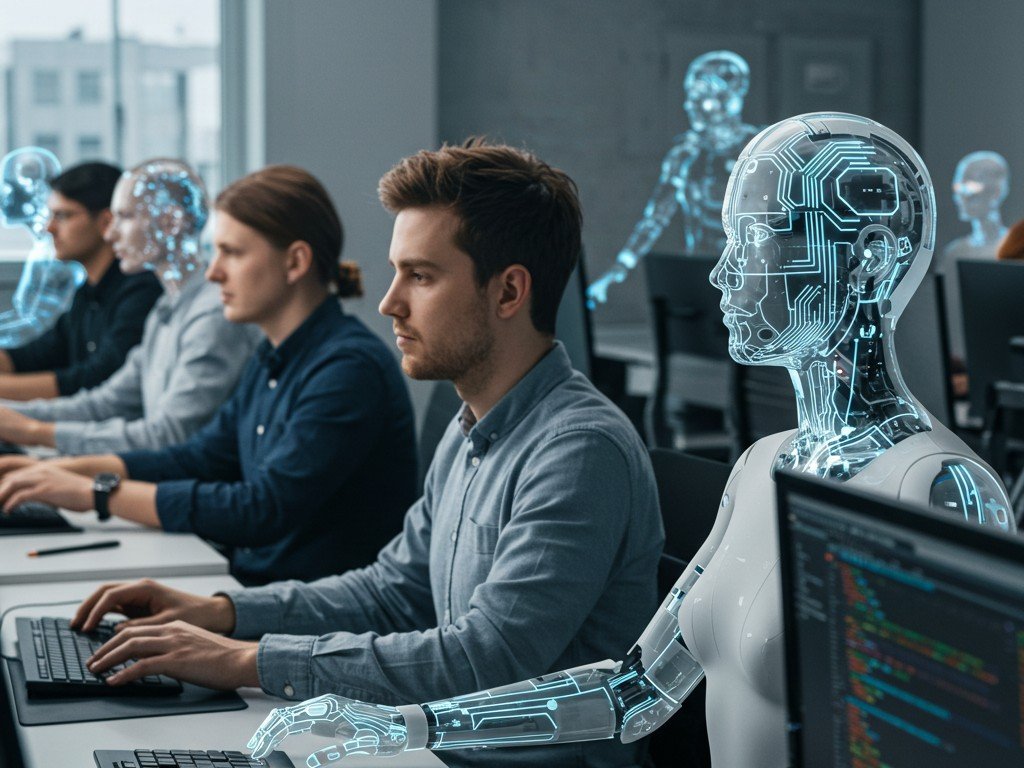Software development is changing right before our eyes, with AI becoming a real workmate for developers everywhere.
This change isn’t just happening in trendy startups either, the tech giants are all in. We got a fascinating peek behind the curtain recently, thanks to a discussion between Microsoft CEO Satya Nadella and Meta’s Mark Zuckerberg.
AI has already changed software development
During Meta’s LlamaCon AI event, Zuckerberg directly asked Nadella about the AI footprint inside Microsoft. His question was plain: “Do you have a sense of how much of the code, like what percent of the code that’s being written inside Microsoft at this point, is being written by AI as opposed to by the engineers?”
Nadella responded that Microsoft keeps an eye on how often developers accept AI coding suggestions and that, while it varies from project-to-project, around 20-30% of the code inside of Microsoft’s repos today are “probably all written by software.”
That means almost one-third of new code in some key areas isn’t being typed out keystroke-by-keystroke by a human, but is already being generated by AI. It shows we’ve moved way beyond simple auto-complete.
Nadella did add a nuance: AI seems to be much better at writing fresh code from scratch than trying to untangle and rework older, existing software. He also touched on the challenge of older programming languages, giving C++ as an example.
Nadella rated C++ as “not that great” for AI to work with, likely due to its complexities. On the flip side, he described AI’s knack for writing modern languages like Python as “fantastic”.
It’s a good reminder that AI isn’t a magic wand in software development; its usefulness depends on the task, the language, and how well-structured things are.
When Nadella flipped the question back to Zuckerberg, asking about Meta’s numbers, Zuck was a bit more reserved about quoting a single metric right now.
Zuck made a fair point, noting that basic stats don’t always reflect software written entirely by other software and can include auto-completion tools. It highlights a tricky problem: how do you accurately measure AI’s input when it can range from a tiny suggestion to writing a whole function?
But Zuckerberg was crystal clear about Meta’s direction when it comes to AI in software development. He even revealed that Meta is focused on “building an AI and a machine learning engineer to advance Llama development itself.”
That’s quite the ambition: using AI to help build better AI, faster.
On this specific project, Zuckerberg dropped a bold prediction that in the next year “half of the development is going to be done by AI as opposed to people and then that will just kind of increase from there.”
Even if this starts just with the Llama project, it paints a picture of AI taking on seriously complex software development work in the near future.
Nadella picked up on this forward-looking theme and mulled whether development tools and entire compute infrastructure should be rebuilt so they can be driven by AI agents.
It makes you wonder: are we moving from AI helpers to AI actually leading parts of the development process? That could fundamentally change the tools and workflows developers rely on every day.
What does this AI shift really mean for developers and the industry?
Hearing from Nadella and Zuckerberg really brings home the two sides of this coin: huge potential alongside some very real bumps in the road.
Where AI can shine in software development:
- Getting more done, faster: As Nadella’s numbers hint, AI can seriously speed things up. It can handle the repetitive stuff, draft standard functions, and suggest fixes, letting human developers focus on the trickier, more creative problems.
- Quicker ideas to reality: Need to test an idea? AI can potentially whip up a basic version much faster than starting from scratch, speeding up innovation.
- Opening doors: AI tools could make coding more accessible for beginners or help experienced pros get up to speed quickly with new technologies.
- Potentially cleaner code: Sometimes, AI trained on massive datasets might suggest more efficient code or spot common errors, although a human check is still essential.
- Shifting the focus: Developers might get to spend less time typing out basic code and more time thinking about the big picture: design, architecture, and strategy.
However, AI also introduces serious questions and challenges:
- Code trust: AI doesn’t “think”; it generates based on patterns. It can produce code that looks right but is subtly broken, insecure, or just plain wrong (“hallucinations”). Thorough testing and human oversight aren’t optional, they’re critical.
- Security worries: When used for software development, AI might copy bad security habits from its training data or introduce new weak spots that are hard for humans to catch.
- Untangling AI code: Fixing bugs in code you didn’t write is always harder. It can be even tougher if the code was generated by AI and its internal logic isn’t obvious.
- The “old stuff” problem: As Nadella hinted with C++, AI often gets tripped up by complex, older systems with lots of quirks and undocumented history. Using AI to modernise these legacy beasts is still really difficult.
- Ownership and copyright: AI-generated code throws up tricky legal questions about copyright and licensing. If the AI learned from open-source code, what rules apply to the code it creates? Companies are still figuring this out.
- What happens to human skills: While AI probably won’t make developers obsolete overnight, the job is changing. Will we rely too much on AI and lose fundamental skills? The role seems to be shifting towards guiding the AI, reviewing its work, and integrating systems.
- Hidden biases: AI learns from the data it’s trained on. If that data contains biases (related to gender, race, etc.), the AI might replicate them in the software it helps build.
The position of Nadella and Zuckerberg appears to be not one of AI taking over, but of partnership. The developer’s role looks set to evolve into something more like a pilot and strategist, with AI acting as a powerful co-pilot.
The human developer: Still in the driving seat
Human skills like critical thinking, smart design, knowing how to ‘prompt’ the AI effectively, rigorous testing, and understanding the ethical side of things are becoming even more important in modern software development.
The future these tech leaders see is one where humans and AI work together. AI takes on some of the coding grunt work, especially for new projects or clearly defined tasks. Humans provide the vision, the expertise, the complex problem-solving, and crucially, the quality control.
The real challenge will be learning how to manage this partnership well, knowing where AI excels and where it falls short, and adapting our tools and methods – maybe even rebuilding them, as Nadella mused – to make the most of it responsibly.
There’s no doubt the AI train has left the station in software development. The exact speed and destination might still be debated, but the journey is happening now. These insights from the very top of the tech world confirm it: AI isn’t just changing the developer’s toolbox; it’s changing the very nature of how we create software.
See also: Endor Labs deploys AI agents to counter vibe coding risks

Want to learn more about AI and big data from industry leaders? Check out AI & Big Data Expo taking place in Amsterdam, California, and London. The comprehensive event is co-located with other leading events including Intelligent Automation Conference, BlockX, Digital Transformation Week, and Cyber Security & Cloud Expo.
Explore other upcoming enterprise technology events and webinars powered by TechForge here.




